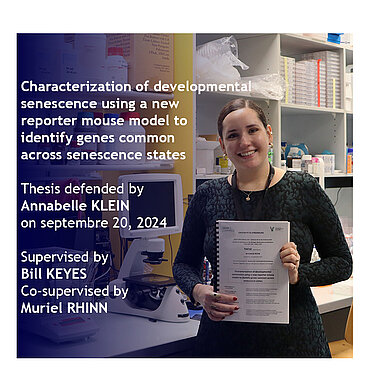Congratulations to Annabelle Klein on the acceptance of her thesis!
Her research, supervised by Bill KEYES and co-supervised by Muriel RHINN,
is titled:"Characterization of developmental senescence using a new reporter mouse model to identify genes common across senescence states"

Summary of her research
Cellular senescence is a cell state characterized by stable cell cycle arrest, various intracellular changes, and a secretory phenotype. While this process can have detrimental effects in certain contexts, it can also be beneficial, such as during embryonic development. To date, there are no specific markers for cellular senescence. In this thesis project, Annabelle validated a new murine model of senescence, the p21-mCherry-CreERT2 mouse, both *in vitro* and *in vivo*. She then used this mouse to define the transcriptome of developmental senescence in embryonic limb buds. This developmental senescence signature was subsequently used for a meta-analysis involving 18 other senescence studies, leading to the identification of numerous candidate genes that could serve as novel markers or mediators of senescence.
Skills acquired at the IGBMC
During her four years of doctoral research, Annabelle gained a wealth of experience. She mastered various experimental techniques, from foundational ones like Western blot and qPCR to more specialized methods like *in ovo* electroporation and SA-ß-Gal staining. Working in a lab dedicated to cellular senescence, she deepened her knowledge of this fascinating field. Beyond technical and theoretical expertise, Annabelle honed her ability to work in a team, navigated the inner workings of academic research, effectively presented her scientific work, and, of course, wrote her thesis!
Life at IGBMC:
The IGBMC is an institute equipped with many critical scientific platforms that greatly facilitate research. Thanks to these resources, Annabelle was able to carry out her project efficiently and to a high standard, with the guidance of skilled professionals. Throughout her PhD, platforms such as flow cytometry, imaging, and cell culture were invaluable. The ICS (Institut Clinique de la Souris) also played a crucial role in her project, from creating a genetically modified mouse model to managing the animals. Moreover, various events were organized to present projects and foster social connections in a friendly atmosphere. Annabelle particularly enjoyed the Get Togethers, Poster Sessions, annual barbecues, and other activities organized by the SPB or the management team!
Funding and partnerships:
Annabelle secured funding for her three-year doctoral project through the IMCBio competition. She then received a one-year extension funded by the ARC Foundation for Cancer Research.
Future projects:
After completing her thesis, Annabelle will stay with her team to finalize and publish her project. During these months, she will also begin exploring opportunities for her next position. Although she has not yet decided on her precise career direction, this period will be critical for her to reflect and plan her next steps.
